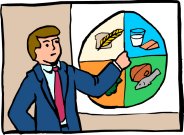
Worksheets and No Prep Teaching Resources
Reading Comprehension Worksheets
Health Professionals

Health Professionals
 Worksheets and No Prep Teaching Resources Reading Comprehension Worksheets Health Professionals |
 Health Professionals |
| edHelper's suggested reading level: | grades 4 to 6 | |
| Flesch-Kincaid grade level: | 9.14 |
|
Dietitians and Nutritionists
By Jennifer Kenny |

|
 1 Ty was a 90 year old patient in a nursing home. He had special dietary needs because of his kidney problems. Who planned his meals? A dietitian or nutritionist did.
1 Ty was a 90 year old patient in a nursing home. He had special dietary needs because of his kidney problems. Who planned his meals? A dietitian or nutritionist did. |
Create Weekly Reading Books
Prepare for an entire week at once! |
| Leave your feedback on Dietitians and Nutritionists (use this link if you found an error in the story) |
 |
Health Professionals
|